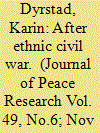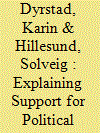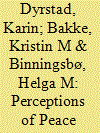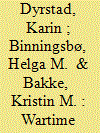|
|
|
Sort Order |
|
|
|
Items / Page
|
|
|
|
|
|
|
| Srl | Item |
| 1 |
ID:
117632


|
|
|
|
|
| Publication |
2012.
|
| Summary/Abstract |
While the study of the causes of civil war is a well-established subdiscipline in international relations, the effects of civil war on society remain less understood. Yet, such effects could have crucial implications for long-term stability and democracy in a country after the reaching of a peace agreement. This article contributes to the understanding of the effects of warfare on interethnic relations, notably attitudes of ethno-nationalism. Two hypotheses are tested: first, that the prevalence of ethno-nationalism is higher after than before the war, and second, that individuals who have been directly affected by the war are more nationalist than others. The variation in ethno-nationalism is examined over time, between countries, and between ethnic groups. Three countries that did not experience conflict on their own territory serve as a control group. The effect of individual war exposure is also tested in the analysis. Sources include survey data from the former Yugoslavia in 1989, shortly before the outbreak of war in Croatia and Bosnia and Herzegovina, and in 2003, some years after the violence in the region ended. Contrary to common beliefs, the study shows that ethno-nationalism does not necessarily increase with ethnic civil war. The individual war experiences are less important than expected.
|
|
|
|
|
|
|
|
|
|
|
|
|
|
|
|
| 2 |
ID:
175337


|
|
|
|
|
| Summary/Abstract |
What explains support for violence against the state? The surge in survey-based studies in (former) conflict areas has improved our understanding of the determinants of armed conflict. Yet, the potential interaction between grievances and political opportunity structure has received little attention in microlevel studies. Integrating common arguments from the civil war literature with the political behavior tradition, this article argues that perceived political efficacy, a central component of the political opportunity structure, moderates the association between individual and group grievance and people’s support for political violence. It represents a first individual-level test of the argument that perceived political opportunity structure and grievances combine to explain internal armed conflict. Using original survey data from Guatemala, Nepal, and Northern Ireland (2016), we find robust empirical evidence that support for violence increases with perceived grievance and decreases with political efficacy; and some evidence of an interaction between the two.
|
|
|
|
|
|
|
|
|
|
|
|
|
|
|
|
| 3 |
ID:
179553


|
|
|
|
|
| Summary/Abstract |
(Re)gaining citizens’ trust is a challenge for post-war governments. Political trust is crucial for understanding both the risk of civil war in the first place and the state-society relationships that emerge afterwards. Peace agreements are tools to stop the fighting, address war’s injustices, and provide a blueprint for the state’s future – and they do so to varying degrees. Yet we have little systematic knowledge of how people react to such agreements and with what consequences. We argue that in post-war societies, people’s perceptions of the strategies aimed at ending the violence and (re)building the state have an enduring impact on people’s view of the state. In this study, we examine the association between post-conflict political trust and people’s approval of peace agreements analyzing a set of nationally representative, comparative surveys from Guatemala, Nepal, and Northern Ireland, three cases where long civil wars were ended by peace agreements. We find that individuals’ approval of the agreement and the perception that it has been implemented are positively associated with political trust, and that accounting for views of the peace agreement substantially improve on conventional explanations for political trust.
|
|
|
|
|
|
|
|
|
|
|
|
|
|
|
|
| 4 |
ID:
187389


|
|
|
|
|
| Summary/Abstract |
Peace agreements are negotiated and signed by representatives of the government and the rebels, often after many years of violent conflict, but their ability to transform a war-torn society hinges on the approval of ordinary people. Yet we have little systematic knowledge of what ordinary people think of peace agreements in the long run. This study begins to fill that gap, drawing on a set of comparative public opinion surveys from Guatemala, Nepal, and Northern Ireland, three cases where long civil wars were ended by peace agreements. The peace agreements in these countries have strong popular support, though there is variation across specific provisions. Across these cases, our findings suggest that legacies of violence are not generally associated with long-term support for peace agreements. However, when we look at provisions that grant concessions to the rebels, there is some evidence of lasting legacies.
|
|
|
|
|
|
|
|
|
|
|
|
|
|
|
|
|
|
|
|
|